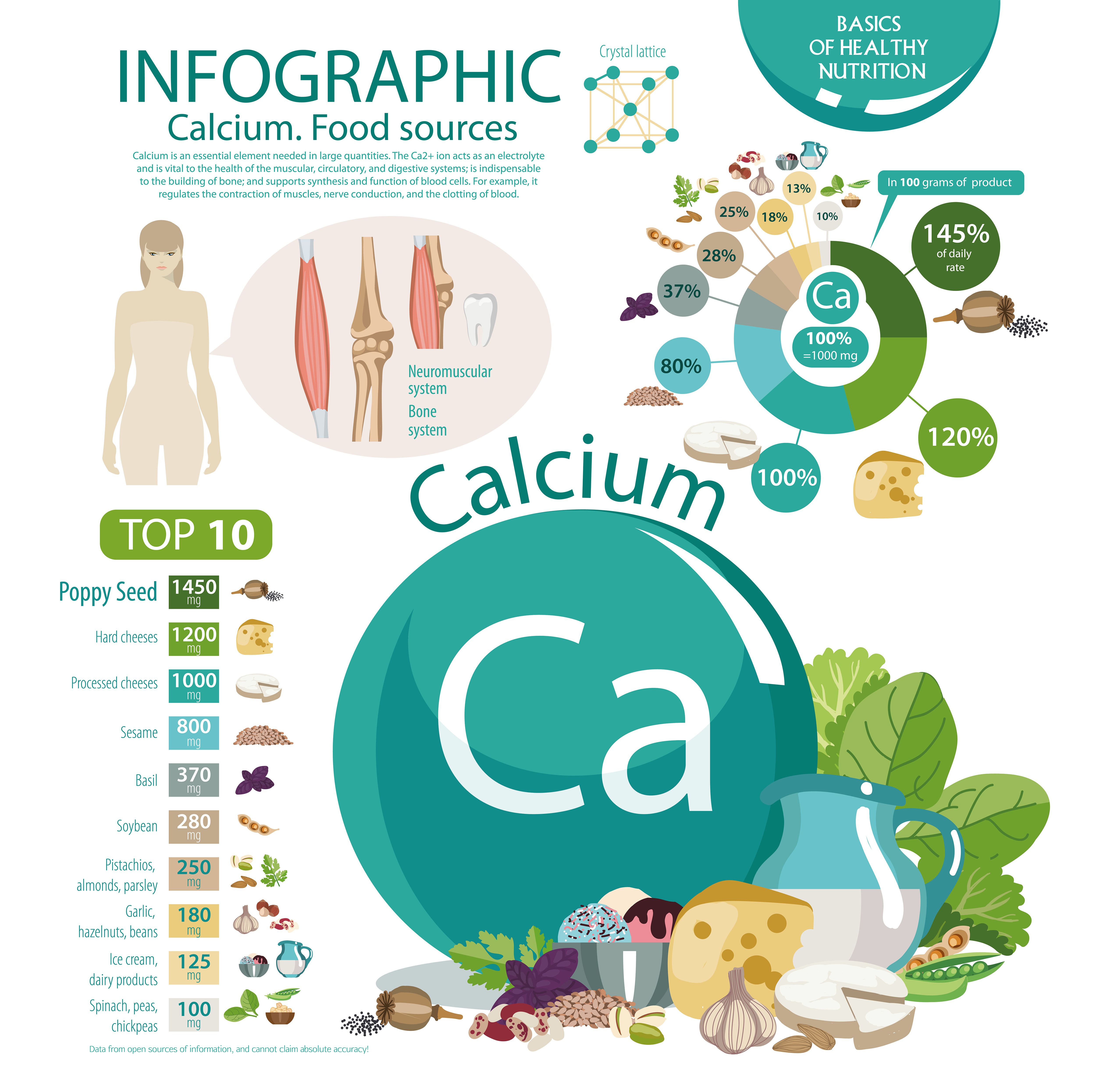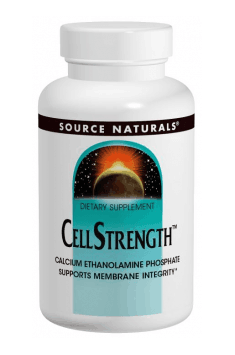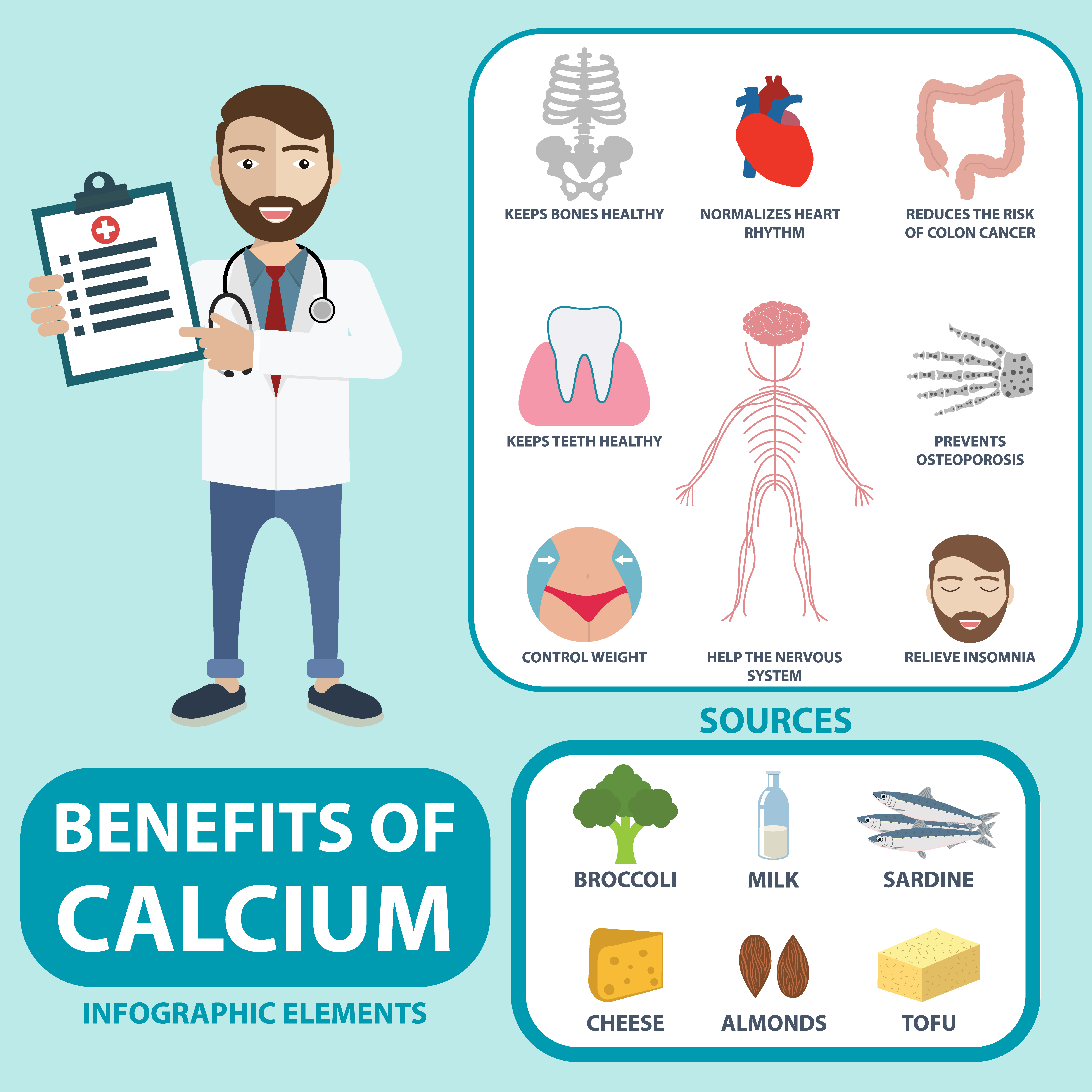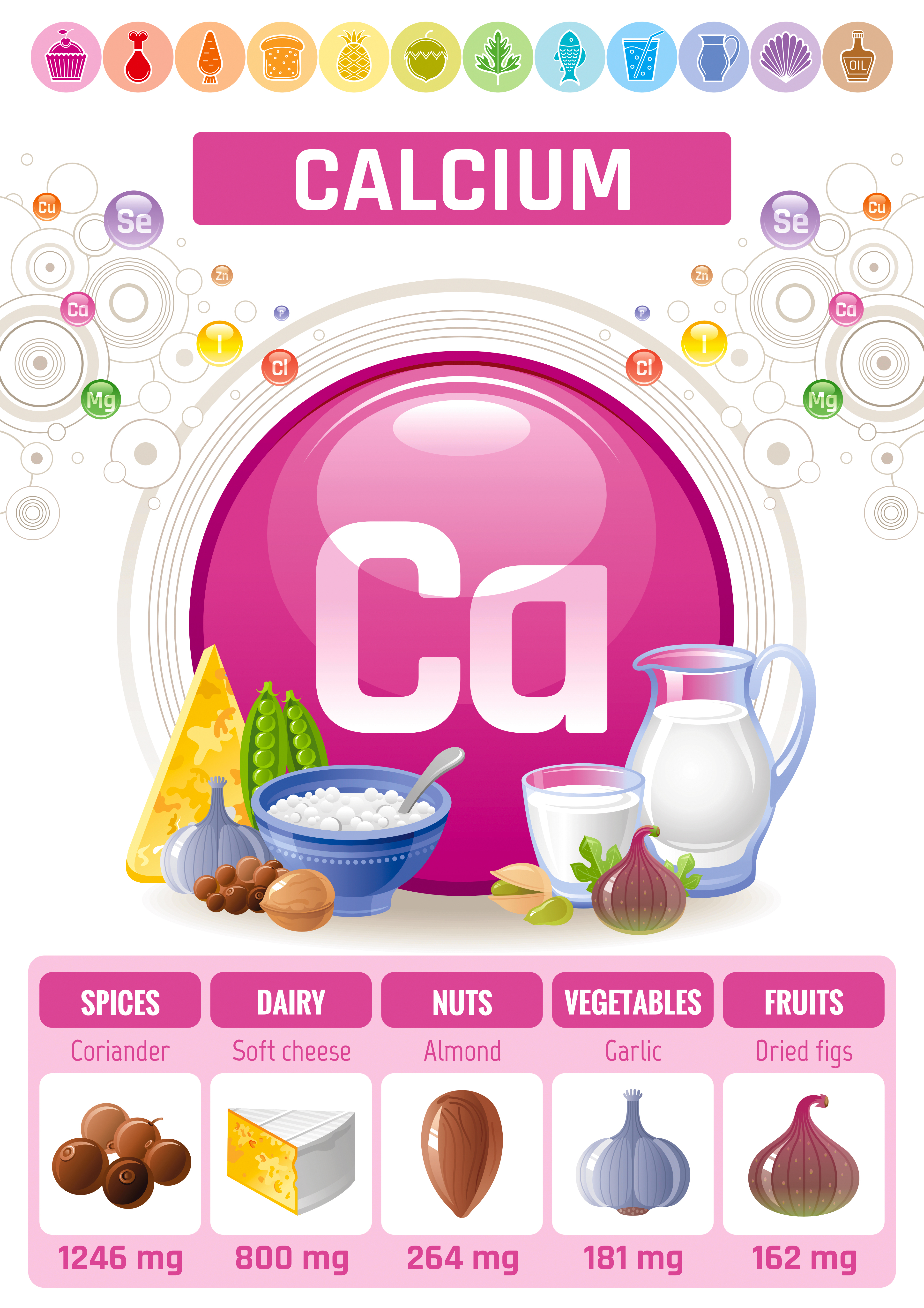People associate the right level of calcium mainly with healthy, strong bones of adequate density. It is a microelement, which in the general opinion is combined only with the good condition of the skeletal structure. Few people know, however, that calcium is also needed to regulate the rhythm of the heart, support the function of muscles, regulate blood pressure and cholesterol. He is also involved in numerous functions of nerve signaling and many, many other important processes.Studies even suggest that calcium, in combination with vitamin D, may also have the potential to protect against cancer, diabetes and heart disease - the three greatest health risks for citizens in highly developed countries.
Calcium - basic info
Calcium is the most abundant mineral in the body, it is mainly stored in bones and teeth. About 99% of this microelement is found in the bones and teeth, mainly in the form of calcium deposits, and the remaining 1% is stored in other tissues of the body. (1)
We all need a relatively large amount of calcium compared to many other trace elements - it is believed that calcium can account for about 2% of the total weight of our body. A quite impressive result, right? Calcium is also needed to control levels of magnesium, phosphorus and potassium in the blood, because these minerals work together to balance each other. Therefore, it is important to avoid calcium deficiency and try to regularly consume calcium-rich foods.
In addition to dairy products, such as cottage cheese or milk, you can also find calcium in some plant products. Green leafy vegetables, such as cabbage, are great sources of calcium, as are legumes, okras or beans.
NOTE It is important to remember that magnesium is the key to calcium absorption. These two elements work in very special relations. If you have calcium deficiency, you may also have a magnesium deficiency - and often magnesium deficiency may be a precursor to later problems with calcium levels! Therefore, care should be taken that the meals are rich in both calcium and magnesium!

1. Calcium deficiency
Every day we lose calcium through the skin, nails, hair, sweat. We also excrete them with urine and stool. Therefore, it is best to take care of its level daily.
Experts believe that most adults in the United States and many other developed countries do not accept enough calcium every day. This is true despite the fact that most of these populations, including Americans and Europeans, consume a lot of dairy products.
It is believed that this discrepancy is due to the fact that calcium is not well absorbed due to the low level of vitamin D3 and other essential nutrients. Another theory is that the soil used in traditional crops, which usually have high levels of calcium, to some extent depletes the minerals - that is why the levels of calcium in food are systematically decreasing.
2. The most important health benefits of supplementing calcium
2.1 It supports proper bone structuring
The biggest group of people suffering from calcium deficiency are children, teenagers and post-menopausal women. (2) Since dairy products are one of the most common sources of calcium, people who are intolerant to lactose or people who do not consume milk for ethical reasons (such as vegans and some vegetarians), increase the risk of calcium deficiency.
Calcium deficiency can cause symptoms and diseases, including:
- Fragile, weak bones
- Bone fractures
- Osteoporosis
- Problems with proper blood clotting
- Weakness and chronic fatigue
- Delays in the development of children
- Heart problems regarding blood pressure and heart rhythm
Calcium is involved in the growth and maintenance of bones in good condition. Calcium, along with other essential minerals such as vitamin K and vitamin D, is needed to maintain bone mineral density and prevent bone weakness and breakage. It helps to create a part of hydroxyapatite, a mineral complex that makes bones and teeth hard, and keeps bone density healthy and helps to regenerate after injuries.
Without enough calcium present in the body, bones are susceptible to fractures and cracks. In order to prevent bone loss, vitamin D3, vitamin K and protein are just as important as calcium, which is why these three ingredients can help protect the bones from age-related degradation (21, 22)
Bearing in mind that eating high doses of calcium in a little-varied diet or taking calcium supplements does not protect against bone problems such as osteoporosis and bone fractures. It can even slightly increase the risk of bone fractures.
2.2 Osteoporosis prophylaxis
Calcium supports bone strength. Calcium supplementation is one of the standard treatments used to prevent and reduce osteoporosis. Osteoporosis is the most common disease in women (especially postmenopausal women), which makes the bones weak, delicate and lose their density over time. There are cavities in the bones.
Although many studies have recently shown that calcium alone can not directly affect the risk of osteoporosis, eating foods with a lot of calcium along with proteins, vitamin K and vitamin D can reduce the risk of skeletal muscle problems.
2.3 It helps to lower high blood pressure
Calcium is involved in regulating heart function due to its role in expanding blood vessels and sending chemical nerve signals from the brain to the heart. This is important for the regulation of the heart rhythm, blood pressure and circulation.
It has been shown that dietary supplements containing calcium help to lower the level of high blood pressure, while diets low in this element increase blood pressure. (24) In the studies, patients experienced a statistically significant decrease in systolic blood pressure when supplemented with calcium. (25)

It is believed that calcium can change blood pressure by altering the metabolism of other electrolytes and playing an active role in blood vessels and muscle strength. (26) Some studies, however, indicate that the effect is too small to promote the use of calcium supplements to prevent or treat hypertension at the moment.
2.4 Cancer prophylaxis
According to the research, there is a significant link between calcium intake and vitamin D and a reduction in mortality due to at least fifteen types of cancers. (27) These include, but are not limited to, cancers of the colon, rectum, breast, stomach, endometrium, kidney cancer and ovarian cancer. These neoplasms show a significant inverse relationship between the incidence and oral calcium intake.
Experimental studies have shown that calcium has anti-cancer activity due to its role in regulating cell proliferation, cell differentiation and induction of cell death (apoptosis) in cancer cells. (28)
However, it should be remembered that calcium supplementation is currently not widely used as a preventive measure for cancer. We need more evidence and a deeper expertise. Some studies show that high calcium intake from certain sources, such as dairy products, can actually increase the risk of prostate cancer.
2.5 It supports the function of muscles and nervous system
Calcium is involved in the release of neurotransmitters in the brain that control muscle movement and nerve signaling. Calcium helps cells communicate in order to transmit nerve responses and activates certain proteins in the body that are needed for the muscles to move and contract. (29) Calcium also helps in controlling and releasing glucose (sugar) in the blood that is used by muscle as a fuel.
2.6 It supports fat loss
The increase in calcium in the diet may positively affect weight loss and fat reduction. In the studies, participants experienced a loss of fat from the torso when they consumed more calcium. (thirty)
2. 7 Diabetes prevention
Vitamin D and calcium consumed together are beneficial in optimizing glucose metabolism and help prevent diabetes. That's at least what say some of the studies. (31) Vitamin D and calcium can have a direct effect on pancreatic cells that control insulin secretion and thus blood sugar levels. Calcium is an important component of cellular processes in insulin-responsive tissues, such as skeletal muscles and adipose tissue.
In one study, the researchers followed 83,779 women who did not have diabetes. The level of vitamin D and calcium intake were evaluated every 2-4 years. During 20 years of follow-up, studies have shown that a total daily intake of more than 1200 mg of calcium and more than 800 IU of vitamin D was associated with a 33% risk of type 2 diabetes (32)
2.8 Needed to maintain proper teeth state
Calcium is stored partly in the teeth and is needed to provide them with health and optimal condition. Calcium protects teeth against caries (33).
2.9 It helps with indigestion
Calcium is used in non-prescription antacids that help digestion, reduce heartburn and symptoms of stomach disorders. (34)
2.10 It can prevent the symptoms of PMS syndrome
Calcium has been shown to be useful in relieving PMS symptoms such as flatulence, cramps, headaches, soreness of the breasts, muscle aches, fatigue and mood swings. (35) Calcium levels change during the menstrual cycle, because as the level of estrogen increases, the calcium level decreases, so eating enough calcium helps to balance and reduce painful symptoms.

3. Is dairy the best source of calcium?
A lot of research has been carried out whether dairy products, especially cow's milk, are an ideal source of calcium. The results were mixed, and some observational studies have shown that dairy has a positive effect on bone health, while other studies show that it has no or potentially harmful effects.
One of the reasons why dairy products are often promoted as the best source of calcium is because they not only contain calcium, but also are a good source of vitamin K, phosphorus and to some extent vitamin D. These nutrients have a significant impact on bone health , like calcium, because they work together to maintain bone mineral density. (18)
Another positive aspect of getting calcium from high-quality dairy products is that dairy products contain a lot of protein. Recently, many studies have shown significant positive relationships between higher protein intake and increased bone mass or density, although initially thought to be opposite. The deliberate restriction of protein in the diet to improve bone condition is unjustified and potentially dangerous for those who consume insufficient protein, researchers said who carried out the study from 2011 to investigate the effect of protein on bone health (19).
Recent studies show that a calcium-rich diet, as well as high protein and other essential nutrients can positively affect bone health, supporting calcium absorption through several biological mechanisms. Therefore, to ensure optimal bone health, it is recommended to consume large amounts of calcium along with other important minerals and protein in a significant amount. Most of these nutrients can be found in high-quality dairy products, such as organic whey protein, unpasteurized milk, organic goat cheese and kefir. (20)
One of the sources of calcium that is almost perfect is fresh milk. Fresh milk is different from regular cow's milk and even from special organic milk because it is simply fresh, raw, unpasteurised and unhomogenised. It distinguishes them from typical milk; it's processes that do not pass, it makes it retain its nutritional values.
Fresh milk comes from healthy cows that are fed grass and gain more nutrients than conventional dairy cows, and therefore their milk is also rich in nutrients. Only a small number of people decide to take advantage of this kind of milk, much more eats pasteurized milk, which contains less nutrients and can actually harm bone health. This is because milk acquires acidity as it passes through the pasteurization and homogenisation process, and acidic substances actually damage bone health, forcing the body to release alkaline substances from the bones to balance the pH level of the blood. Milk straight from the cow on the other hand, in the natural state, is an alkaline food that supports bone health.

It is also possible to get enough calcium without consuming dairy products. Vegetarians and vegans who have a balanced diet, for example, can obtain calcium from plant sources, including marine vegetables (algae), leafy vegetables or various types of beans.
4. Concerns about calcium
A lot of controversy was about how much calcium people should consume, especially when it comes to the potential negative effects of calcium supplements. While different experts have different opinions in the field of calcium supplementation, everyone agrees that getting calcium from a healthy diet should be a priority for everyone.
The body absorbs calcium from food better than from supplements and it is much less likely that you will achieve very high, harmful calcium levels from the food itself.
Further research is needed, but in recent years, some researchers have found that there may be a relationship between high levels of calcium (mainly in the form of supplements) and heart disease. (36, 37) Calcium can potentially cause platelet accumulation in the arteries, as well as hardening and stiffening of the arteries, which is a dangerous heart disease called atherosclerosis.
It can lead to a heart attack or stroke, but at this point, nothing is certain, because the study showed different results. Other controversy regarding calcium is associated with the potential for increased risk of cancer, including breast cancer and prostate cancer. (37)
Research on the association of cancer and calcium also gave mixed results - some show negative correlations, some show positive correlations, and some show that calcium does not affect the incidence of cancer. Because we still do not know much, it is not recommended that everyone take calcium supplements regularly, especially not in high doses, without talking to the doctor first.
When taking calcium you need a lot of vitamin D (D3), but you should not overdo it. Calcium and vitamin D taken in very large amounts can lead to problems, because vitamin D increases the effectiveness of calcium.
As with all nutrients, it is never a good idea to take more than the dose you need. In this case, very high levels of calcium may negatively affect medicines intended for the treatment of heart disease, diabetes, epilepsy and other conditions. In large amounts, calcium may also increase the risk of kidney stones and may disrupt the absorption of other important minerals such as iron, magnesium and zinc.






